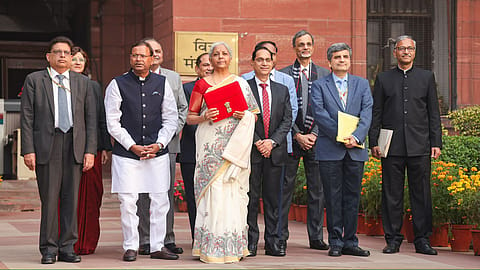Budget 2025: Govt allocates ₹1.28 lakh cr for education
The government has allocated ₹1.28 lakh cr to the Ministry of Education, with ₹50,077.95 cr earmarked for higher education & ₹78,572.10 cr for school education

Finance Minister Nirmala Sitharaman, in her record eighth Union Budget presentation on February 1, 2025, announced several measures aimed at bolstering education and skilling in India. The government has allocated ₹1.28 lakh crore to the Ministry of Education, with ₹50,077.95 crore earmarked for higher education and ₹78,572.10 crore for school education.
Among the key announcements, Sitharaman said that 50,000 Atal Tinkering Labs will be set up in government schools over the next five years “to cultivate the spirit of curiosity and innovation and foster a scientific temper among young minds.” Additionally, broadband connectivity will be extended to all government secondary schools and primary health centres in all rural areas under the Bharat Net Project.
“The establishment of 50,000 Atal Tinkering Labs and a Centre of Excellence for AI in education, with an outlay of ₹500 crore, will further strengthen India’s innovation ecosystem, enabling future generations of tech leaders,” said Shweta Rajpal Kohli, president and CEO, Startup Policy Forum.
“The Budget's focus on setting up National CoE for skilling is an exciting announcement which would help in upskilling our growing youth talent which is in dire need of these measures to compete on a global level,” said Lt. Gen. AK Bhatt, director general, Indian Space Association (ISpA). He added, “Also, the announcements around New Fund of Funds (FoF), setup of 50,000 Atal Tinkering Labs, an enhanced Credit Guarantee Scheme for Startups and the Deeptech Fund of Funds will give further push to the growing startup ecosystem including the space startups which are at a nascent stage."
The Finance Minister also outlined plans for expanding the capacity of Indian Institutes of Technology (IITs). She shared that the number of students in the 23 IITs had 100% doubled from 65,000 to 1.35 lakh over the past decade. Additional infrastructure will be developed at the five IITs established after 2014, and IIT Patna will also undergo expansion.
“While no details are yet available, a fund of funds for deep tech is also a good idea and can augur technological innovation in the country. This complements the announcement of ten thousand fellowships for technological research. However, what is disappointing is that it is limited to only IITs and IISc. We need a deepening of research across several universities and institutes - limiting the fellowship to only a few institutes is contrary to that,” said Dr Partha Chatterjee, dean of Academics and Professor of Economics, Shiv Nadar University.
The finance minister further proposed a Centre of Excellence for AI in education with a budget of ₹500 crore. Experts are optimistic that AI integration in education will enhance youth skilling and drive significant learning advancements.
Recommended Stories
“By allocating resources to AI education and training programs, the government is equipping the workforce with essential skills to navigate an increasingly digital economy. This forward-looking approach will not only prepare talent for evolving job demands but also drive innovation and global competitiveness,” said Sunil Chemmankotil, country Manager, Adecco India.
“The announcement of CoE in Artificial Intelligence for Education with a total outlay of ₹500 crore will be a big booster for the digital economy,” said Anshuman Magazine, chairman & CEO, India, Southeast Asia, Middle East & Africa, CBRE.
Expanding on measures introduced in the July 2024 Budget, Sitharaman said five National Centres of Excellence for Skilling will be established with global expertise and partnerships. These centres aim to "equip our youth with the skills required for make for India, make for the world" in manufacturing, she said.
“The creation of national centres for skilling with global expertise under ‘Make for India’, alongside provisions for 10,000 fellowships for technological research in IITs and IISc, will play a pivotal role in bridging the talent gap and preparing professionals for the future of work.
(INR CR)
The Bharatiya Bhasha Pustak scheme was also introduced in the Budget to provide digital Indian language books for schools and higher education institutions.
Lastly, in a measure spanning both education and healthcare, Sitharaman announced the addition of 10,000 seats in medical colleges and hospitals to address the growing demand for medical education and healthcare professionals.
“The addition of 10,000 new medical seats, towards the goal of 75,000 seats in the next five years, will help address the shortage of healthcare professionals and equip the next generation with vital skills,” said Nilesh Aggarwal, founder of Medtalks.